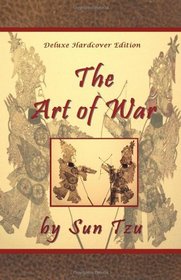Search -
The Art of War by Sun Tzu - Deluxe Hardcover Edition
The Art of War by Sun Tzu Deluxe Hardcover Edition
Author:
This deluxe hardcover edition of The Art of War presents Sun Tzu's timeless instructions regarding military strategy and managing conflict in two forms. — The first part contains "The Art of War" in English, without notes or commentary. This allows the reader to understand the teachings of Sun Tzu, without the distraction of footnot... more »
Author:
This deluxe hardcover edition of The Art of War presents Sun Tzu's timeless instructions regarding military strategy and managing conflict in two forms. — The first part contains "The Art of War" in English, without notes or commentary. This allows the reader to understand the teachings of Sun Tzu, without the distraction of footnot... more »
ISBN-13: 9781934255162
ISBN-10: 1934255165
Publication Date: 6/22/2009
Pages: 260
Edition: Deluxe
Rating: ?
ISBN-10: 1934255165
Publication Date: 6/22/2009
Pages: 260
Edition: Deluxe
Rating: ?
0 stars, based on 0 rating
Publisher: El Paso Norte Press
Book Type: Hardcover
Members Wishing: 2
Reviews: Amazon | Write a Review
Book Type: Hardcover
Members Wishing: 2
Reviews: Amazon | Write a Review
Genres:
- History >> Military >> Strategy
- History >> Military Science
- Religion & Spirituality >> Other Eastern Religions & Sacred Texts >> Eastern Philosophy
- Nonfiction >> Philosophy >> Eastern >> General
- Engineering & Transportation >> Engineering >> Military Technology




